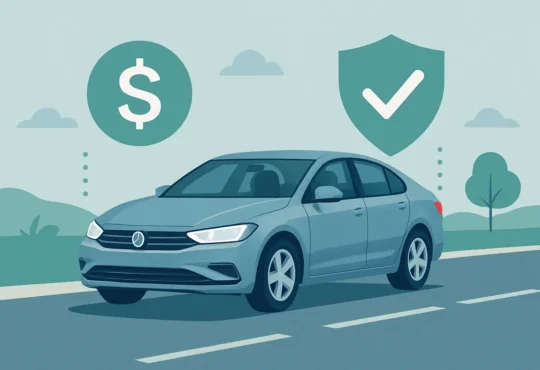Get the best business car insurance quote for your company. Compare rates, coverage options & save money. Ultimate 2025 guide for small business owners.
Getting the right business car insurance quote is crucial for protecting your company’s vehicles, employees, and bottom line. Whether you’re a small business owner with one company car or manage a fleet of commercial vehicles, understanding how to navigate the business auto insurance landscape can save you thousands of dollars while ensuring comprehensive protection.
In this complete guide, we’ll walk you through everything you need to know about business car insurance quotes, from understanding coverage types to finding the best rates for your specific needs.
What is Business Car Insurance?
Business car insurance, also known as commercial auto insurance, is specialized coverage designed to protect vehicles used for business purposes. Unlike personal auto insurance, commercial policies are specifically tailored to address the unique risks and liabilities that businesses face when operating vehicles.
Nationwide recommends at least $500,000 in liability coverage per vehicle, as business vehicles often face higher liability risks than personal vehicles due to increased usage and potential for more severe accidents.
Key Differences Between Personal and Business Auto Insurance
Coverage Limits: Business policies typically offer higher coverage limits to protect against larger liability claims that businesses might face.
Usage Classification: Business insurance covers vehicles used for work-related activities, including deliveries, client visits, and employee commuting in company vehicles.
Driver Coverage: Commercial policies can cover multiple drivers and employees operating business vehicles.
Liability Protection: Enhanced protection for business assets and operations beyond just the vehicle itself.
Types of Business Car Insurance Coverage
Understanding the different types of coverage available is essential when requesting business car insurance quotes. Each type addresses specific risks your business might face.
Essential Coverage Types
Liability Insurance
- Bodily injury liability: Covers medical expenses and legal costs if your business vehicle injures someone
- Property damage liability: Pays for damage your vehicle causes to other people’s property
- Combined single limit vs. split limits options available
Collision Coverage
- Covers damage to your business vehicle from collisions with other vehicles or objects
- Includes coverage for single-vehicle accidents and rollovers
- Typically includes a deductible that you choose based on your risk tolerance
Comprehensive Coverage
- Protects against non-collision damage such as theft, vandalism, fire, flood, and weather damage
- Essential for businesses operating in areas prone to natural disasters or high crime rates
- Often required by lenders if you’re financing business vehicles
Medical Payments Coverage
- Covers medical expenses for you and your employees injured in a business vehicle accident
- Applies regardless of who is at fault in the accident
- Particularly important for businesses with multiple employees driving company vehicles
Specialized Business Auto Coverage
Hired Auto Coverage
- Protects your business when employees drive rental cars for business purposes
- Covers situations where personal auto insurance might not apply
- Essential for businesses that frequently require employee travel
Non-Owned Auto Coverage
- Covers your business if an employee uses their personal vehicle for business and causes an accident
- Provides secondary coverage when the employee’s personal insurance is insufficient
- Critical for businesses where employees regularly use personal vehicles for work
Cargo Coverage
- Protects goods, materials, or equipment being transported in business vehicles
- Particularly important for delivery businesses, contractors, and service companies
- Coverage limits vary based on the value of goods typically transported
Average Cost of Business Car Insurance
Small businesses pay an average premium of $147 per month, or $1,762 annually, for commercial auto insurance, though costs vary significantly based on multiple factors.
Cost Breakdown by Business Size
Small Businesses (1-5 vehicles):
- Among Insureon’s small business customers, 37% pay less than $100 per month for commercial auto insurance and 26% pay between $100 and $200 per month
- Average annual cost: $1,200 – $2,400 per vehicle
Medium Businesses (6-20 vehicles):
- Average monthly cost: $200 – $500 per vehicle
- Fleet discounts often available to reduce per-vehicle costs
Large Fleets (20+ vehicles):
- Customized pricing based on specific fleet characteristics
- Significant volume discounts and specialized coverage options available
Factors That Affect Business Car Insurance Quotes
Understanding what influences your business car insurance rates helps you make informed decisions and potentially reduce costs.
Vehicle-Related Factors
Type of Vehicle
- Commercial trucks and heavy equipment cost more to insure than passenger cars
- Vehicle age, make, and model significantly impact rates
- Safety ratings and theft rates for specific models influence pricing
Vehicle Value and Replacement Cost
- Higher-value vehicles require more expensive comprehensive and collision coverage
- Custom equipment or modifications increase replacement costs and premiums
Vehicle Usage
- Delivery vehicles face higher rates due to increased road time and urban driving
- Service vehicles visiting client locations have different risk profiles than office-based vehicles
- Annual mileage directly correlates with premium costs
Business-Specific Factors
Industry Type
- Construction and contracting businesses typically face higher rates
- Professional service businesses often qualify for lower rates
- Delivery and transportation businesses require specialized coverage and pricing
Location and Operating Territory
- Urban areas with higher accident rates result in increased premiums
- States with higher minimum coverage requirements affect base rates
- Parking location (secure garage vs. street parking) influences theft risk
Business Credit Score and Financial Stability
- Insurance companies often consider business credit scores when calculating rates
- Financial stability indicators can qualify businesses for better rates
- Claims history and loss experience significantly impact renewal pricing
Driver-Related Factors
Driving Records
- Clean driving records for all covered drivers result in lower rates
- Traffic violations and accidents increase premiums substantially
- Regular monitoring of employee driving records is essential for maintaining low rates
Driver Experience and Training
- Experienced commercial drivers often qualify for discounts
- Defensive driving course completion can reduce rates
- Regular safety training programs may qualify for additional discounts
How to Get Business Car Insurance Quotes
Step 1: Gather Necessary Information
Before requesting quotes, compile the following information:
Vehicle Information:
- Year, make, model, and VIN for each vehicle
- Current mileage and estimated annual usage
- Vehicle modifications or special equipment
- Garaging location for each vehicle
Business Details:
- Industry classification and business description
- Years in business and annual revenue
- Number of employees who will drive company vehicles
- Geographic areas where vehicles will operate
Driver Information:
- Driver’s license numbers for all covered drivers
- Driving records for the past 3-5 years
- Experience with commercial vehicles
- Any completed safety training programs
Step 2: Determine Coverage Needs
Work with your insurance agent or broker to determine appropriate coverage levels:
Liability Coverage:
- Consider state minimum requirements as a starting point
- Evaluate your business assets and potential lawsuit exposure
- Factor in the types of activities your vehicles will be used for
Physical Damage Coverage:
- Assess the value of your vehicles and equipment
- Consider your business’s ability to absorb out-of-pocket expenses
- Evaluate the impact of vehicle downtime on your operations
Step 3: Compare Multiple Quotes
When comparing business car insurance quotes, consider:
Coverage Comparisons:
- Ensure you’re comparing equivalent coverage limits and deductibles
- Review policy exclusions and limitations carefully
- Consider additional coverages that might benefit your specific business
Insurer Reputation:
- Research financial stability ratings from AM Best
- Read customer reviews and complaint ratios
- Evaluate claims handling reputation and service quality
For guidance on effectively comparing insurance quotes, check out our comprehensive guide on how to shop car insurance quotes.
Top Business Car Insurance Providers
Progressive Commercial
Progressive Commercial offers comprehensive business auto insurance with competitive rates and flexible coverage options. They specialize in small to medium-sized fleet coverage and provide online quote tools for quick estimates.
Progressive Commercial Advantages:
- Quick online quoting process
- Flexible payment options
- Strong claims service network
- Discounts for multiple vehicles and safety programs
GEICO Commercial
GEICO Commercial Auto Insurance provides 24/7 coverage for business vehicles with competitive rates and comprehensive service options.
GEICO Commercial Features:
- Round-the-clock vehicle protection
- Various factors considered for customized pricing
- Strong financial backing and stability
- User-friendly digital tools and claims processing
The Hartford
The Hartford offers specialized business insurance solutions with extensive experience serving small to large businesses.
The Hartford Advantages:
- Commercial auto insurance costs an average of $574 a month for their customers
- Comprehensive business insurance packages available
- Strong customer service reputation
- Specialized coverage for various industry types
Nationwide Commercial
Nationwide Business Auto Insurance provides commercial vehicle coverage with customizable options for businesses of all sizes.
Nationwide Benefits:
- Customizable coverage options
- Fleet management services
- Risk management resources
- Competitive pricing for various business types
Money-Saving Tips for Business Car Insurance
1. Bundle Multiple Policies
Combining your business auto insurance with general liability, property insurance, or workers’ compensation can result in significant discounts. Many insurers offer Business Owner’s Policy (BOP) packages that bundle essential coverages.
2. Implement Driver Safety Programs
- Conduct regular driver training sessions
- Perform background checks and monitor driving records
- Install telematics or fleet tracking systems
- Reward safe driving with recognition programs
3. Choose Higher Deductibles
Increasing your deductible can substantially reduce premium costs, but ensure your business can handle the higher out-of-pocket expense in case of a claim.
4. Maintain Good Business Credit
Many insurers consider business credit scores when calculating rates. Maintain good financial standing to qualify for better rates.
5. Regular Policy Reviews
Review your coverage annually to ensure it still meets your needs and compare rates from different providers. Business needs change, and so do insurance markets.
For additional money-saving strategies, explore our article on 7 tips to get discount car insurance quotes which includes tactics applicable to business policies.
When to Update Your Business Car Insurance
Adding New Vehicles
Contact your insurance provider immediately when acquiring new vehicles. Most policies provide automatic coverage for a limited time (typically 30 days), but you must formally add vehicles to maintain continuous protection.
Employee Changes
Update your policy when adding or removing employees who drive company vehicles. Driver information changes can affect your rates and coverage.
Business Expansion
Notify your insurer when:
- Expanding into new geographic areas
- Changing business activities or industry classification
- Significantly increasing annual mileage
- Adding new types of vehicles or equipment
Claims and Violations
Report accidents and claims promptly, even if you don’t plan to file a claim. Some policies require immediate notification regardless of fault or damage severity.
State Requirements for Business Auto Insurance
Each state has different minimum insurance requirements for commercial vehicles. Common requirements include:
Minimum Liability Coverage:
- Bodily injury liability per person and per accident
- Property damage liability per accident
- Some states require combined single limits instead of split limits
Additional State Requirements:
- Uninsured/underinsured motorist coverage
- Personal injury protection (PIP) or medical payments coverage
- Higher minimums for commercial vehicles vs. personal vehicles
Registration and Documentation:
- Proof of insurance required for vehicle registration
- SR-22 filings may be required for high-risk drivers
- Commercial vehicle permits may require specific coverage levels
Business Car Insurance for Different Industries
Construction and Contracting
Construction businesses face unique risks and typically require higher coverage limits due to:
- Heavy equipment and specialized vehicles
- Job site hazards and increased accident risk
- Higher liability exposure from property damage
Recommended Coverage:
- Higher liability limits ($1 million+)
- Comprehensive coverage for expensive equipment
- Hired auto coverage for rental equipment
Delivery and Transportation
Delivery businesses need specialized coverage for:
- High mileage and urban driving conditions
- Cargo protection and customer property
- Driver turnover and varying experience levels
Essential Coverage Options:
- Cargo insurance for goods in transit
- Higher liability limits for public interaction
- Non-owned auto coverage for contractor drivers
Professional Services
Professional service businesses (consulting, real estate, etc.) typically qualify for lower rates but should consider:
- Professional liability coordination with auto coverage
- Client property protection during transport
- Employee business use of personal vehicles
Food Service and Catering
Restaurants and catering businesses require coverage for:
- Food delivery operations
- Specialized equipment transport
- Temperature-controlled cargo protection
Claims Process for Business Auto Insurance
Immediate Steps After an Accident
- Ensure Safety: Check for injuries and move to safety if possible
- Call Emergency Services: Contact police and medical assistance if needed
- Document the Scene: Take photos of vehicles, property damage, and the accident scene
- Exchange Information: Collect insurance and contact information from all parties
- Contact Your Insurance Company: Report the claim as soon as possible
Working with Insurance Adjusters
Be Prepared to Provide:
- Police report number and responding officer information
- Photos and documentation from the scene
- Witness contact information and statements
- Medical records if injuries occurred
- Repair estimates and vehicle information
Understand Your Rights:
- Right to choose your repair facility (in most states)
- Right to request a different adjuster if needed
- Right to dispute claim decisions through proper channels
Managing Business Disruption
Rental Car Coverage:
- Understand your policy’s rental car provisions
- Know daily limits and total coverage periods
- Consider upgraded rental coverage for specialized vehicles
Lost Business Income:
- Some policies include coverage for lost income due to vehicle accidents
- Document business disruption and financial impact
- Work with your adjuster to understand available coverage
Frequently Asked Questions About Business Car Insurance
Do I need business car insurance if employees use personal vehicles?
Yes, if employees regularly use personal vehicles for business purposes, you should have non-owned auto coverage. This protects your business if an employee’s personal insurance is insufficient to cover damages in a business-related accident.
Can I use personal auto insurance for occasional business use?
Personal auto policies typically exclude business use, so occasional business driving may not be covered. Contact your personal insurance provider to understand your policy’s business use restrictions.
How does business car insurance differ from fleet insurance?
Fleet insurance typically refers to coverage for larger numbers of vehicles (usually 5+) and often includes specialized fleet management services. Business car insurance can cover single vehicles or small fleets with standard commercial auto policies.
What happens if an uninsured employee drives a company vehicle?
Your business policy should cover any authorized driver of your company vehicles, but you should maintain proper documentation of who is authorized to drive. Unauthorized use may not be covered under your policy.
Future Trends in Business Auto Insurance
Telematics and Usage-Based Insurance
More insurers are offering usage-based insurance programs that monitor:
- Driving behavior and safety metrics
- Vehicle location and route optimization
- Maintenance scheduling and vehicle health
- Real-time risk assessment and pricing adjustments
Electric and Alternative Fuel Vehicles
As businesses adopt electric and hybrid vehicles:
- Specialized coverage for battery systems and charging equipment
- Different repair and replacement considerations
- Potential discounts for environmentally friendly fleets
- Infrastructure coverage for charging stations
Autonomous and Semi-Autonomous Vehicles
The future of commercial vehicle insurance will need to address:
- Liability questions for autonomous vehicle accidents
- Cybersecurity coverage for connected vehicles
- Product liability vs. traditional auto liability coverage
- Driver monitoring and intervention systems
Conclusion
Securing the right business car insurance quote requires careful consideration of your specific business needs, risk factors, and budget constraints. With small businesses paying an average of $147 per month for commercial auto insurance, it’s essential to shop around and compare options from multiple providers.
Remember these key points when shopping for business car insurance:
- Assess Your Coverage Needs: Don’t just meet minimum requirements; consider your business’s specific risks and assets
- Compare Multiple Quotes: Rates can vary significantly between providers for the same coverage
- Consider the Total Package: Look beyond price to evaluate service quality, claims handling, and additional benefits
- Review Regularly: Your insurance needs will change as your business grows and evolves
- Work with Professionals: Consider using an insurance broker who specializes in commercial coverage
For businesses looking to compare multiple insurance options efficiently, our free auto insurance comparison quotes guide provides valuable strategies for evaluating different providers and coverage options.
Taking the time to properly research and compare business car insurance quotes can save your company thousands of dollars while ensuring you have the protection you need to operate confidently. Whether you’re insuring a single company car or managing a large fleet, the right insurance partner will help protect your business assets and support your continued growth.
For additional insights into insurance comparisons, explore our related guides on Progressive vs Allstate and State Farm vs GEICO to understand how major insurers compare in the commercial insurance market.
Thanks for visiting TechsBucket


